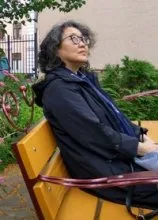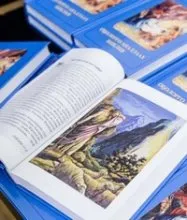
The time zone is not the only thing that is different in Moscow and Yakutia. Another major difference is the climate, and though everyone knows that Yakutia is a very cold place, fewer people know that almost every year Yakutia has a very short but hot period in the middle of summer. During this time the temperature may rise to 38 degrees Celsius (100 degrees Fahrenheit) and the taiga forest frequently catches on fire. In wintertime, on the other hand, the main trouble for the population is frostbite. Several years ago Sargylana’s own nephew, who was a little boy at the time, was on the verge of losing a finger to frostbite. The doctors thought that amputation was inevitable, but many people prayed for the boy. The doctors were therefore surprised and relieved to announce that the boy’s hand could be spared and treated medically. Praise God, this was a real miracle! “If it had been amputated,” Sargylana says, “his whole life would have been ruined – everybody would think of him as an alcoholic, since it is usually drunk people who stay out in the cold too long, get their fingers frostbitten, and need to have them amputated.”

“I never start my translation with putting down my draft on paper immediately,” Sargylana continues. “I always read my version aloud first, because Yakuts are a very musical people, and it is important to make the translation sound pleasant. If I stumble when reading my own translation to myself, I understand that it is not smooth enough. Fortunately, we all know each other in the village, and whoever comes into the house, I ask them to listen. These can be people of different ages, but it’s the older people who immediately hear what can be improved and whose comments are most precious. Once my former classmate Sergei came to our house. His life has not been successful by outward standards. His house burned down when he was drunk, and since then he has been living with his friends. However he is the best mechanic in the village and he is such a person that even when wronged, he harbors no grudge against people. He is also the most avid reader in our village, and if you could only hear him talk! The time he came to our house he spoke Yakut worthy of being written down by the best linguistic scholars. His speech was sumptuous. This is what the language of the Bible translation should be – vivid, flexible, delicious. I see the primary reading audience of our Bible translations not necessarily in those who are already Christian believers, but in common Yakut villagers, like Sergei, who know and treasure their mother tongue.”

“Oh, yes, that’s true!” she smiled. “However, that nephew of mine, whose finger was saved from amputation… He is 14 now. My brother says that he always takes the Yakut Children’s Bible with him wherever he goes. Once somebody died at my brother’s work, and there is a Yakut tradition that after a person is buried, his friends should spend a night at the place where he died. My brother went there with his son, and the boy took the Children’s Bible with him even on this occasion. They needed to stay awake for the whole night, but my brother has poor health and needed to sleep, so he took his son with him to keep vigil, and the boy was reading the Children’s Bible all night long. I have never seen him with any other book in his hands. How joyous it is for me that my nephew enjoys reading it so much!”
We expect to print the Yakut-Russian biblical glossary in the near future. The cost would be approximately $ 3 per copy.
We would greatly appreciate your financial assistance towards this project.
If you prefer to send your donation through a forwarding agent in the U.S. or Europe,
please write to us and we'll provide the details of how this can be done.
IBT Russia/CIS is a non-profit organization financed through contributions from individuals, sponsoring organizations and foundations.
You can donate to IBT:
Through: AO UniCredit Bank, Moscow
SWIFT: IMBKRUMM
In favour of: Institute for Bible Translation
Address: 119334, Russia, Moscow, Andreevskaya nab. 2
TIN (INN) 7736231521
9-digit Bank identification code in Russian banking system: 044525545
Account no. (IBAN):
634261 USD 4020 02 001 or 40703840700010142881
634261 EUR 4020 02 001 or 40703978700010366720
634261 GBP 4020 02 001 or 40703826600010366723
Through: NOSTRO ACCOUNTS OF AO UNICREDIT BANK, MOSCOW:
USD JPMORGAN CHASE BANK N.A., NEW YORK SWIFT CODE: CHASUS33
EUR UNICREDIT BANK AG (HYPOVEREINSBANK) , MUNICH SWIFT CODE: HYVEDEMM
EUR UNICREDIT BANK AUSTRIA AG, VIENNA SWIFT CODE: BKAUATWW
EUR UNICREDIT S.P.A., MILANO SWIFT CODE: UNCRITMM
GBP THE ROYAL BANK OF SCOTLAND PLC, LONDON SWIFT CODE: RBOSGB2L
Important! In the field "designation" write "CHARITY DONATION"
For more information address IBT
You may sign up to receive our Russia/CIS monthly English newsletter here
